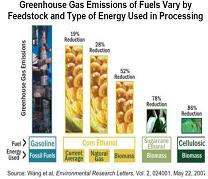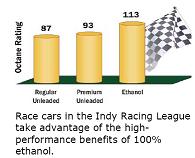 A new paper from the U.S. Department of Energy tries to put to rest some of the myths that still swirl around biofuels.
A new paper from the U.S. Department of Energy tries to put to rest some of the myths that still swirl around biofuels.
The document, posted on the DOE web site, takes on some of the most-often repeated arguments against renewable energy with solid facts:
 MYTH: In terms of emissions, biofuels emit the same amount as gasoline or more.
MYTH: In terms of emissions, biofuels emit the same amount as gasoline or more.
FACT: Biofuels burn cleaner than gasoline, resulting in fewer greenhouse gas emissions, and are fully biodegradable, unlike some fuel additives.
MYTH: Ethanol cannot be produced from corn in large enough quantities to make a real difference without disrupting food and feed supplies.
FACT: Corn-based ethanol is only one source of biofuel. As we address the technical hurdles associated with the efficient and cost-effective production of biofuels, ethanol will increasingly play a more significant role.
 MYTH: Ethanol gasoline blends can lower fuel economy and may harm your engine.
MYTH: Ethanol gasoline blends can lower fuel economy and may harm your engine.
FACT: Ethanol blends in use today have little impact on fuel economy or vehicle performance.
MYTH: More energy goes into producing ethanol than it delivers as a fuel.
FACT: Each gallon of corn ethanol today delivers as much as 67% more energy than is used to produce it.
Although the document is just a couple of pages long, it should be must reading for anyone in the biofuels industry so they can dispel the myths with the facts.


 A study by the Freedonia Group Inc. says that demand for biofuels throughout the world will grow by 20 percent a year to 92 million metric tons in 2011.
A study by the Freedonia Group Inc. says that demand for biofuels throughout the world will grow by 20 percent a year to 92 million metric tons in 2011. According to the
According to the  Last fall, Grassley and several other senators wrote the Environmental Protection Agency requesting testing of blends of ethanol above 10% for non-flexible fuel vehicles. Now
Last fall, Grassley and several other senators wrote the Environmental Protection Agency requesting testing of blends of ethanol above 10% for non-flexible fuel vehicles. Now 
 The U.S. Department of Energy’s
The U.S. Department of Energy’s  “Research cooperation among government, industry and academia is needed to efficiently address the many questions about how to find the best ways to convert biomass to liquid transportation fuels,” said Tom Foust, technology manager for NREL’s National Bioenergy Center.
“Research cooperation among government, industry and academia is needed to efficiently address the many questions about how to find the best ways to convert biomass to liquid transportation fuels,” said Tom Foust, technology manager for NREL’s National Bioenergy Center. An additive to biodiesel has been approved by the State of Texas for its low-emission program.
An additive to biodiesel has been approved by the State of Texas for its low-emission program. DMI Industries, a leading manufacturer of wind generator towers, has named Stefan Nilsson as president of the West Fargo, North Dakota-based company.
DMI Industries, a leading manufacturer of wind generator towers, has named Stefan Nilsson as president of the West Fargo, North Dakota-based company. The
The 